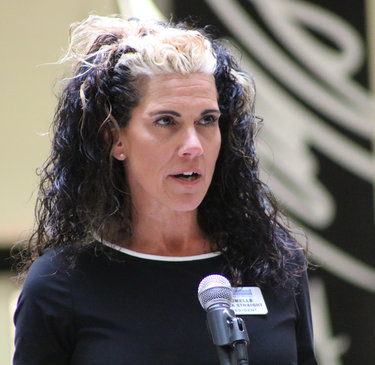Veterans Miracle Center to lose biggest donor in January, seeks assistance
ALBANY COUNTY — It’s been a banner year for the Veterans Miracle Center, but the loss of its largest food donor looks to make 2025 a difficult year for the military-focused not-for-profit that has served more than 25,000 veterans over its 10 years in operation.
Executive Director for Community Relations Michelle Viola Straight told The Enterprise this week that the organization had more than doubled the people it serves this past year through successful outreach efforts.
Now, the loss of the donor threatens the food-supply part of the organization’s mission to support veterans. Viola Straight said food is about half of the group’s operation, and that the donor — which she did not name but had described as “big-box” — had provided about 90 percent of its dry, shelf-stable items.
She said that the group was given about a month’s notice, and only has two or three weeks of stockpile to use.
“We have to come up with another plan,” Viola Straight said.
She said she believes the donor pulled out for “tax purposes.”
“A lot of the larger donors are going a different route, so it’s becoming more challenging for us,” she said. “You have to write grants for a lot of these foods, and then you have to do reporting for it and it becomes more layered for an already very-taxed organization.”
It poses a significant threat to the military population in the region, which Viola Straight said is experiencing greater food instability due to inflation, static military salaries, and loss of benefits.
“Just this weekend, I met with a young girl who’s active duty, who literally had no food in her house,” she said, “so we did an emergency drop to make sure she’s covered, to get her through the next couple of weeks, and then we’re going to connect her to additional services.”
In response to the loss, Viola Straight said people will often tell her that veterans can just as easily use one of the many other food pantries in the Capital District. She called that response a “slap in the face.”
“The issue is that it’s hard enough for us to connect to the veteran and military families that we have to get them … to allow us to help them with household goods, hygiene products, necessities they need for their families and their kids,” Viola Straight said.
“Sending them off to another food pantry, we’re going to lose them,” she said
She explained that civilians working with veterans and active-duty members can create a “big disconnect,” since the population has unique needs.
“If we just try to send them off into the community, into places that don’t understand what they’re going through, don’t understand the culture of being in the military, don’t understand what their needs are, that could make them pull in more, become more introverted, more depressed, feel more alone,” Viola Straight said, adding that there were six local military suicides in the last couple of weeks, all of them under 40 and most with young children.
“This is what we’re trying to stop,” she said. “These service members shouldn’t feel like they just need to be pushed on the line and have people talk to them that have no idea what they did.”
This is on top of the usual reluctance people in need often have about accepting help.
“Historically,” Viola Straight said, “if you ask a service member, ‘Hey are you struggling? Do you have food now,’ the answer is always going to be, ‘Yeah, I’m fine, give it to someone who really needs it ….’ Pride is a big thing.”
To help the organization as it figures out how to replace the lost donor, she said the community can either donate money that it can then spend on pantry items, or host food drives.
Ideally, she said, the drives would be “hosted in large companies where you have 100, 200 employees or more.”
Anything shelf-stable “that you use in your daily life,” will be helpful, and “if they could do those drives, then we can continue to fill the needs that we’re seeing” in the military community, Viola Straight said.



